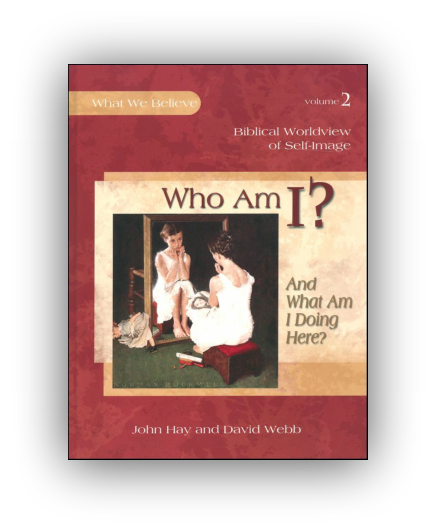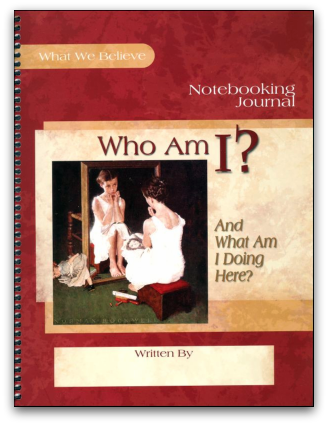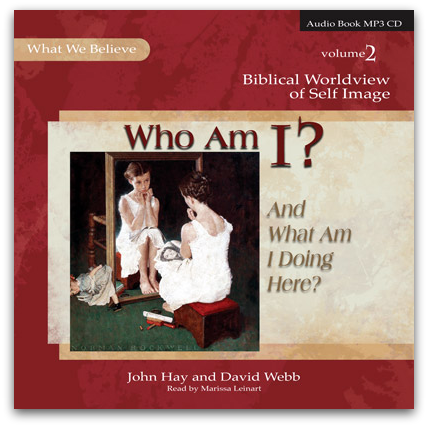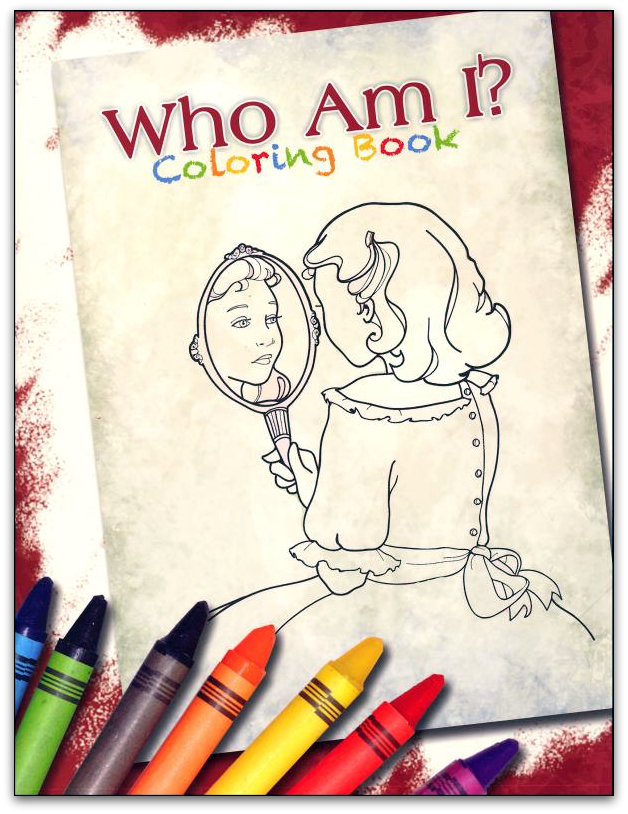We were so excited for a chance to review Apologia's Who Am I?, from the What We Believe series, especially since we had already been doing the first book in the series, Who Is God?, which I had purchased several months ago. I have been looking for books that teach about a Biblical Worldview, and these are some of the best that I have found.
Why do we need to teach our children from a Biblical Worldview? Are we brainwashing them to believe as we do, as some accuse us of doing? In actuality, I believe we are doing the opposite. We are explaining to our children what a worldview is and how it affects them; we are teaching them to think for themselves. Children are, at birth, unable to process much of the data from the environment around them and make conclusions based on that data. They are something like the tabula rasa, or blank slate, in John Locke's theory. In the nature vs. nurture debate there are, of course, arguments for both sides: that children are born with certain attributes, or that they gain attributes through experience as they grow. The answer, as in so many debates, must lie somewhere in between. It is clear, however, that as they grow, children's thought patterns and problem-solving processes are influenced by what they are taught. This becomes their worldview. Everyone has a worldview of some sort. If you were raised on streets full of thieves and have learned by experience that most people are dishonest, then you will not easily trust people because of your worldview. On the other hand, if you were raised in an environment where no one did anything dishonest, then you may believe everyone is honest and you will trust more easily. Either worldview can be altered when evidence appears to the contrary, but they are difficult to shake.
Assume, for example, that you were raised in a culture that believed heavily in magic and superstition. If you met a witch doctor who seemed to make a small animal disappear, would you believe that he had made that happen? Most likely. It would fit with both your worldview and the data that you observed. Now, if you were raised in America and had a more skeptical worldview, you may see the same witch doctor do the same trick, and you would probably start looking around for his trapdoor or hiding place. You saw the same evidence that the person in the other culture did, but it did not fit with your worldview, so you started looking for more evidence to reconcile the data with what you knew to be true. The fact that I called what the witch doctor did a "trick" shows what my worldview is, and I wasn't even thinking about it when I typed it. Obviously, however, only one of those worldviews is correct. The witch doctor either made the animal disappear, or he didn't. They cannot both be true. If we want to know what is true, we will try to determine which worldview is correct, not just the one that we like the best.
A worldview, then, is how you interpret the information you have based on what you know to be true. It is impossible not to have a worldview. A child who goes to public school and is never told anything about God has just as much of a worldview as the child who is homeschooled in an overtly Christian home. He does not have less of a worldview; he just has a different worldview. If one wants to call teaching from a perspective of a specific worldview "brainwashing," then the children in any public school, private school, or home are all being "brainwashed." They are all being taught to interpret data based upon some set of facts, be they true or false. Since a worldview that is incorrect, such as in the example of our witch doctor, will cause one to arrive at the wrong conclusions, then it is important to have the foundation of the correct worldview in order to process all the information and experiences we have in our environment.
What then, is the correct worldview? Undoubtedly, no person is likely to always be right on every interpretation and every conclusion drawn in life. We must do the best we can, and some small parts of our worldview may change over time. The best gift I can give my children, though, is the foundation of a basic, true worldview to start out with. A framework of what we know to be true and that will not change. I believe that is a Biblical worldview. If you disagree with me, then obviously your next question will be, how do you know that the Biblical worldview is correct? That will have to be the topic of another blogpost, or even a novel, as this blogpost is already stretching quite long and I haven't even gotten to the chapters of the book yet. I do not believe this worldview blindly, just because my parents taught it to me, and I do not teach my children to believe it blindly. I believe it is important for them to know that there are other worldviews, and what the reasons are that I believe in this one. I will get to that another time, but for the purposes of this review, suffice it to say that for numerous reasons, I have concluded that the Biblical worldview is True, and it is important to teach my children from that foundation.
If you want to teach your children about the Biblical worldview, Apologia's What We Believe series is for you. Specifically, this second book in the series, Who Am I? And What Am I Doing Here?, deals with a Biblical worldview of self-image, and that age-old question of purpose. The book explains what a worldview is, what the Biblical worldview is, and how that worldview will affect the choices you make. It uses material from the Bible, other historical anecdotes about people like Abraham Lincoln and Winston Churchill, well-known stories like Peter and the Wolf, and lesser known facts and stories. It teaches what some other people's worldviews are. Overall, it is a thorough and effective study of the subject, and it can be overlapped with studies in history, language arts, and art, to name a few. It is also set up well for teaching integrated ages.
For this review, I received the textbook, notebooking journal, coloring book, and audio book on CD for the Who Am I? volume. This combination works perfectly for my children, with their different ages and learning styles. The things they are learning in here also work very well with some of the other products we have reviewed this year. The curriculum is geared toward children ages 6-14, but it can be adapted for children who are slightly older or slightly younger. I whole-heartedly recommend Who Am I? and the whole What We Believe series. The textbook may be purchased online directly from Apologia for $39.00. See the catalogue for prices of other items and the rest of the What We Believe series. Apologia also carries curriculum for science, history and geography, writing, and other homeschooling resources.
To see what other TOS Crew members thought of this curriculum, click here.
Disclaimer: I received free copies of some of the above products in exchange for a fair review. No other compensation was given, and all opinions are my own.






No comments:
Post a Comment